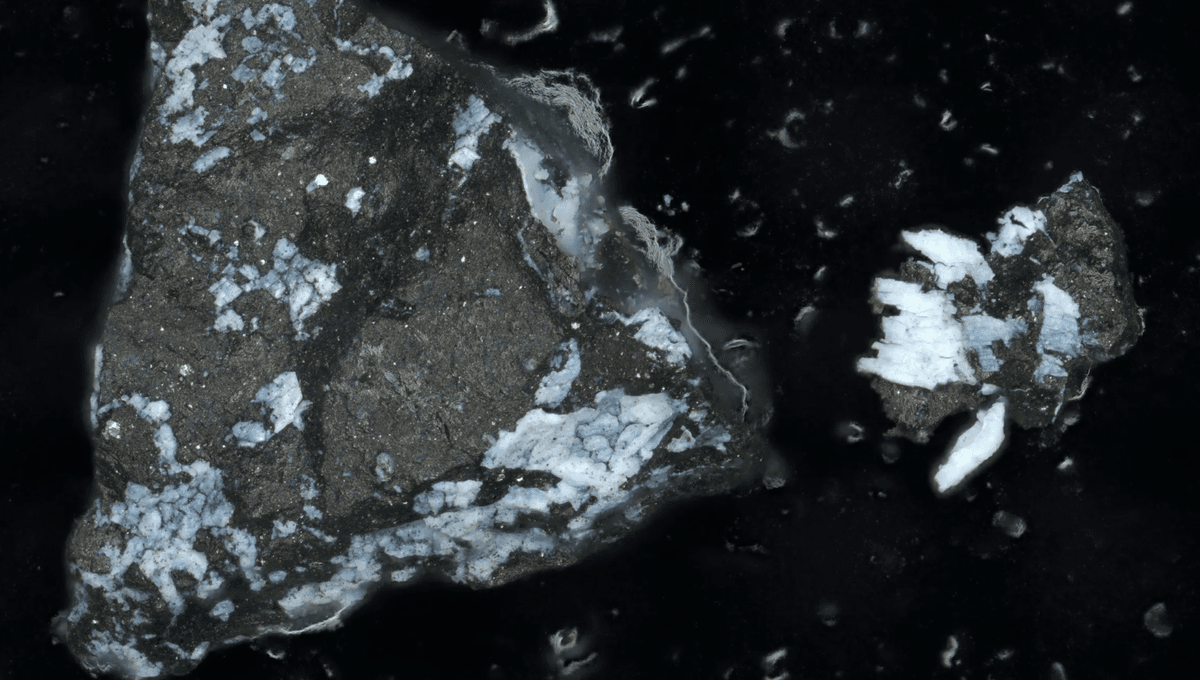
The sample collected by OSIRIS-REx on asteroid Bennu continues to deliver unique insights into the history of this small space rock and the early Solar System. In the first few weeks following the opening of the sample, evidence began to show that Bennu might have had a wet past. A new discovery now adds to that.
Researchers have reported the detection of magnesium-sodium phosphate. This came as a shock, as it was not detected by the spacecraft from orbit. It makes an even stronger case for Bennu being a splintered-off chunk of a much larger primitive ocean world.
Phosphate minerals were found on the asteroid sample from Ryugu collected by the Japanese Space Agency’s Hayabusa-2. They have also been found in meteorites. But the Bennu sample is outstanding due to the size of the grains and their purity.
“The presence and state of phosphates, along with other elements and compounds on Bennu, suggest a watery past for the asteroid,” Dante Lauretta, co-lead author of the paper and principal investigator for OSIRIS-REx at the University of Arizona, Tucson said in a statement. “Bennu potentially could have once been part of a wetter world. However, this hypothesis requires further investigation.”
“OSIRIS-REx gave us exactly what we hoped: a large pristine asteroid sample rich in nitrogen and carbon from a formerly wet world,” added Jason Dworkin, a co-author on the paper and the OSIRIS-REx project scientist at NASA’s Goddard Space Flight Center in Greenbelt, Maryland.
There are multiple reasons for the team to consider Bennu a piece of an ocean world. One is the presence of serpentinite, a type of rock that forms when molten rocks meet water, like in the mid-ocean ridges on Earth. There are also a lot of soluble substances, which appear to have been shifted by fluids. And we can add to that the confirmation of phosphates.
The team proposes a body with abundant liquid water, possibly under an icy or rocky exterior. The icy moon of Saturn called Enceladus is a good analogy, although Bennu’s parent body would be about half its size, 250 kilometers (155 miles) across. Collisions in the past separated the 500-meter (1,630-foot) wide Bennu.
“We’re still coming up with ideas on how to test [the wet parent body hypothesis]. But to me, it’s the leading candidate for the geologic environment that these rocks formed in,” Professor Lauretta told IFLScience in an exclusive interview back in March.
The sample continues to be distributed to labs in the US and around the world (the transport of the precious material was practiced long before the sample landed). In March the team presented 58 findings from the initial analysis, and new insights come out every week. As the pool of scientists expands, we will be getting even more science from it.
“The Bennu samples are tantalizingly beautiful extraterrestrial rocks,” said Harold Connolly, co-lead author on the paper and OSIRIS-REx mission sample scientist at Rowan University in Glassboro, New Jersey. “Each week, analysis by the OSIRIS-REx Sample Analysis Team provides new and sometimes surprising findings that are helping place important constraints on the origin and evolution of Earth-like planets.”
The study is published in the journal Meteoritics & Planetary Science.
Source Link: “Tantalizingly Beautiful” Rocks Yield More Evidence That Asteroid Bennu Came From A Wet World